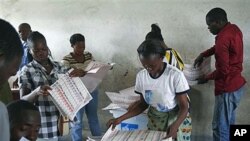In the Democratic Republic of Congo, a top official of main opposition Union for Democracy and Social Progress (UDPS) says presidential candidate Etienne Tshisekedi will only accept the outcome of a transparent and credible general election.
Albert Moleka, the Cabinet director of the party and spokesman for Mr. Tshisekedi, said the poorly organized general election shows the Independent National Electoral Commission is not “ready to respect the people’s vote.”
“Mr. Tshisekedi was overwhelmed by the response of the Congolese population. What we saw on Monday was a kind of revolution,” said Moleka. “You can see the people transforming themselves into observers and even into witnesses. Everybody wanted to vote, but then they were confronted with the fraud and flaws that we [saw] on Monday.”
Both the African Union and the U.S.-based Carter Center poll observer missions urged presidential and legislative candidates to accept the results.
Moleka said Tshisekedi wants the electoral process to be completed before passing any judgment on the credibility of the vote.
“His position is that we should go until the end of this whole process even though there were many flaws and shortcomings that we pointed out,” said Moleka. “We need to go until the end to demonstrate that the awareness of the people can even overcome all the fraud that we have experienced.”
He also said there are “legal ways” to challenge the credibility of the outcome of the presidential and legislative vote.
Moleka said his party is disappointed that the polls were poorly organized but praised the voters for their conduct.
“According to the law the election is supposed to be organized in one day [November 28], but surprisingly, after the legal hours of the day, Mr. Mulunda [electoral chief] decided to extend indefinitely the voting,” said Moleka. “Even worse, we are seeing cargo planes flying mainly from Johannesburg to the Lubumbashi and Kinshasa airport[s] with voting materials, even now. So why are the planes still coming here?”
He called Tshisekedi a democrat who “will accept the result of the election that would be credible and transparent.”
Pascal Kambale, the country director of the Open Society Initiative of Southern Africa, expressed concern about voter irregularities, describing the exercise as poorly administered. His monitoring group deployed about 5,000 observers to polling stations across the country.
“The elections were conducted in such a manner that indicated that the electoral commission was simply not ready, logistically,” said Kambale. “A lot of polling stations did not have ballot papers and some didn’t have the ballot papers on time. The most common complaints that we have from across the country was probably millions of voters did not get their names on the voter list.”
Kambale said some voters expressed concern that the voters’ lists were displayed at polling stations a day or in some cases the same day of the poll, which he said is against Congo’s electoral code. It stipulates that voters register should be displayed at least a month ahead of the election.
“So on this account and many other accounts, it looks like the electoral commission failed the population [and] the voters,” he said.
Kambale praised the public.
“It’s fair to say this was a victory of the people’s determination to make this election their election and to try to make the election as fair and as transparent as possible, because where it worked, it worked - not because of the commission’s failure but because of the people,” said Kambale.
The African Union and the Southern African Development Community welcomed the successful holding of the vote.




